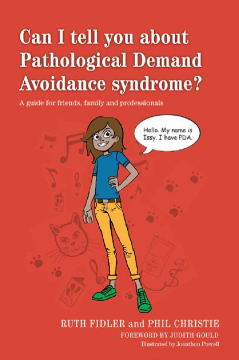
BOOK
Can I tell you about Pathological Demand Avoidance syndrome?
Ruth Fidler | Phil Christie | Judith Gould | Jonathon Powell
(2015)
Additional Information
Book Details
Abstract
Meet Issy – an 11-year-old girl with pathological demand avoidance syndrome (PDA), a condition on the autism spectrum. Issy invites readers to learn about PDA from her perspective, helping them to understand how simple, everyday demands can cause her great anxiety and stress. Issy tells readers about all the ways she can be helped and supported by those around her.
This illustrated book is for readers aged 7 and upwards, and will be an excellent way to increase understanding about PDA in the classroom or at home. It also includes practical tips and recommended resources for parents and professionals.
This is a delightful book that provides both detailed and very useful information about PDA from the perspective of 11 year old Issy. Issy's insights are fascinating reading and will definitely help professionals, parents and children themselves in understanding this complex condition. Issy's feedback is very down to earth and very believable, for example, she says "Some days it's like I have sore feet and no shoes on. Moving forward on those days is really hard." She tells the reader a great deal about PDA and how to manage it within a basic narrative about her life at school and at home. The illustrations are clear and simple, assisting in providing a glimpse into Issy's emotional world and insights.
In addition, two very experienced and knowledgeable professionals provide excellent insights and resources in areas such assessment and intervention in PDA. They manage to capture their many years of experience and insights into this complex condition in a focused chapter which will be invaluable to all involved in working in this area. Their focus on explaining the 'altered approach' is very helpful, providing insights into how PDA is part of the autistic spectrum and that this is important in managing the condition.
This is a concise and authoritative overview into understanding PDA, a complex condition, which continues to challenge many families and professionals.
Dr Laura Cockburn, Specialist Psychologist and Manager, Lorna Wing Centre, National Autistic Society
A valuable resource and excellent value for money for any educational establishment. For such a little book it is incredibly informative and I would highly recommend it to teachers, parents/carers and professionals as an excellent introduction to the condition,
Good Autism Practice (GAP)
This informative little handbook is narrated by Issy, an 11 year old girl with PDA (an autism spectrum condition). She shares with readers what it is like to have this condition... The last part of the book is written from an adult perspective and takes up this topic in the section 'How other people can help'... For me, what is particularly good about this useful resource is its positive approach to the topic.
Jill Bennett
Red Reading Hub blog
Ruth Fidler and Phil Christie's significant experience and expertise in PDA is evident throughout this book. Through the character Issy, children, parents and professional alike can increase their understanding of the complexities experienced by children with this condition and the strategies required to assist these children to have a quality of life. I would highly recommend this book.
Dr Jacqui Ashton Smith, Executive Director of Education, National Autistic Society
Ruth Fidler is Education Consultant at Sutherland House School, Norsaca Children's Services. She has worked with children across the autism spectrum including those with PDA since 1993. Ruth is actively involved in delivering training nationally about PDA to parents and professionals. She also works directly with children and young people with complex autism and PDA where her areas of focus include developing self awareness, interactive approaches, emotional well being and promoting an understanding of how the autism spectrum affects individuals. She lives in Nottingham, UK with her 3 children. Phil Christie is a Consultant Child Psychologist to the Elizabeth Newson Centre (ENC) and also works on an independent basis. Through the centre he provides diagnostic assessments of children from across the UK and has a particular specialism in PDA. Phil delivers training nationally on PDA and promoting emotional well-being in children with autism. He is a member of the programme board of the Autism Education Trust and also lives in Nottingham, UK.
This is an invaluable resource for anyone working or living with a child with PDA as well as an ideal book for talking to children more about their diagnosis. Issy is a charismatic character and many parents of children with PDA will immediately recognise her style. It is a fantastic addition to the developing resources for this condition.
Margaret Duncan, GP, The PDA Society
PDA is another part of the jigsaw within the autistic spectrum. This book offers us an
"insider perspective" which enriches our understanding and knowledge. It is full of helpful advice and practical approaches, and I would highly recommend it to teachers, parents and all professionals working with children with PDA, (or who, from reading this book, realise that they are!).
Professor Barry Carpenter, OBE, Honorary Professor in the field of Learning Disabilities at Universities in the UK, Ireland, Germany and Australia
The two authors of this book (Ruth Fidler and Phil Christie) are authorities in the field... The majority of the book is written from the perspective of an 11 year-old girl, Issy, who also has PDA... There are countless clear, simple explanations throughout this section about autism in general, the specifics of PDA, as well as lots of examples of how it impacts Issy's daily life... As someone who supports a child with this condition, I found it made me see things from a new, more compassionate perspective. The second part of the book contains information and strategies that, in the authors' experience, can help support children with PDA... If you have contact with someone with PDA, you really should get hold of it.
Mark Haworth, time Specialist Support/AuKids' reader panel
AuKids Magazine
